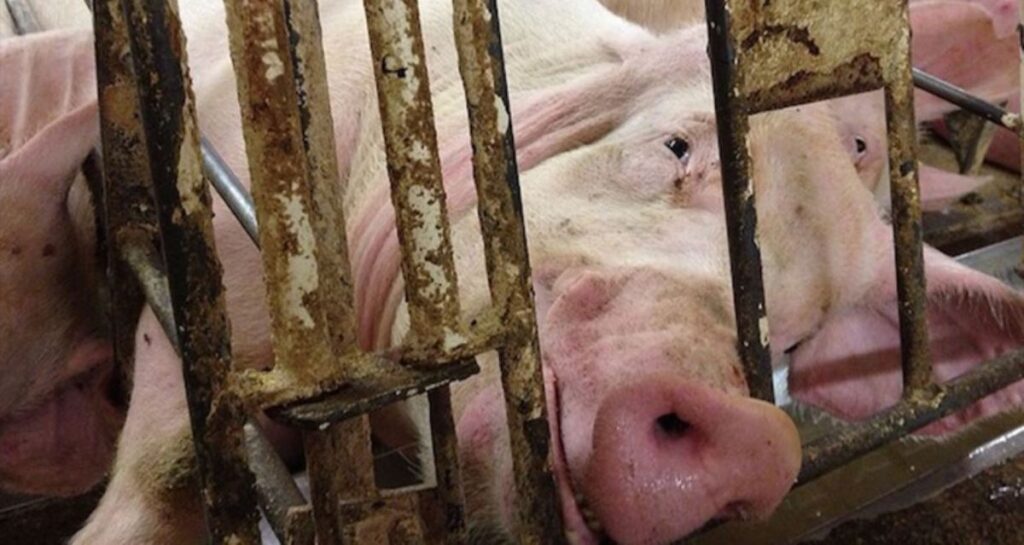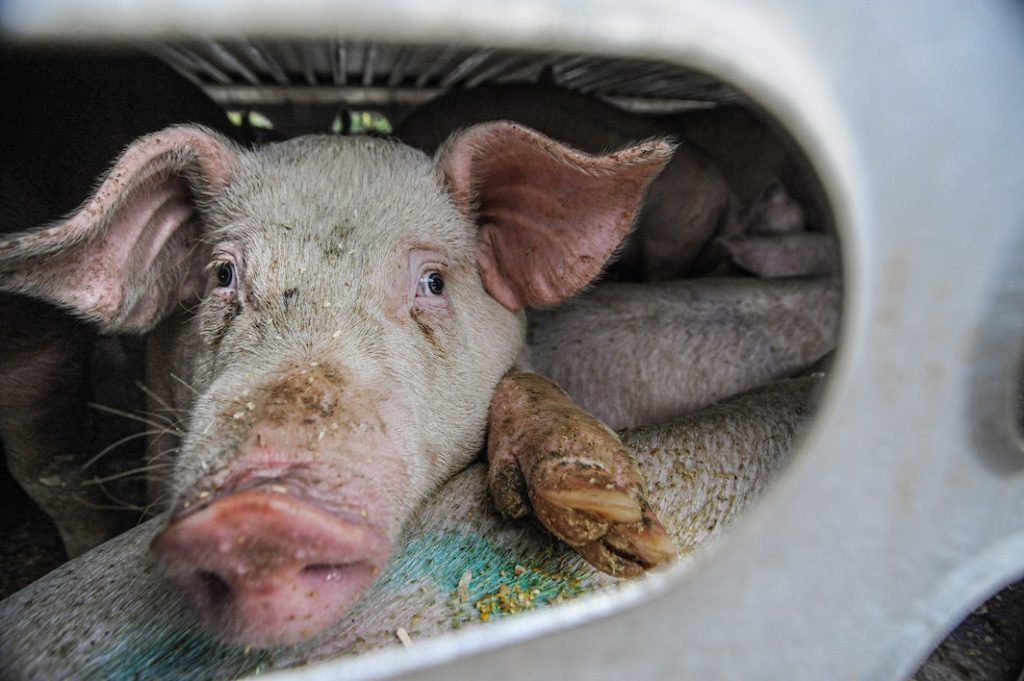
Pork Producers Contrived Rebellion Against California’s Prop 12
by Wayne Pacelle
Despite the unmistakable verdict of California voters that they want to wrap up the era of extreme confinement of farm animals, the National Pork Producers Council (NPPC) and other agribusiness and food-industry players are working to bully the courts and the Congress to undermine Proposition 12 and to allow the indefinite imprisoning of sows in metal cages and of laying hens in bread-box-sized cages. All provisions of the voter-approved measure, which sets up in-state animal housing and sales standards forbidding extreme confinement, were to go into effect as the new year began.

In January, however, a California Superior Court judge sided with California retail interests seeking to block some limited portion of the anti-confinement measure, ruling that the California Department of Food and Agriculture (CDFA) has failed to complete its required rulemaking that aids in implementation of Prop 12. The key provision targeted in the legal action is the requirement that each breeding sow have at least 24 square feet of space.
The judge’s ruling limits enforcement of that 24-foot space requirement for six months, with an order for CDFA to complete its rulemaking so that retailers understand what’s expected of them. But the judge’s order does not block implementation of the ban on the sale of pork from animals confined in gestation crates, as other provisions are in effect that require sows be able “to stand up, lie down, turn around, and freely extend their limbs” — all behavior standards in conflict with gestation-crate housing. Other provisions of Prop 12 prescribing detailed space requirements for laying hens and veal calves are in full effect. In short, all egg sales must come from animals living in cage-free environments.
A Phony Crisis Cooked Up by Factory Farm Interests
The pork industry has been doing its best to manufacture a crisis, falsely claiming that Prop 12 will cause bacon prices to surge. But, in a case of bad timing for them, agribusiness giants are playing defense because of inflated meat prices that hit consumers well before the ballot measure took effect. The Biden Administration has called out price-gouging by the highly consolidated meat industry, including meat packers. It’s “the greed of meat conglomerates” according to White House press secretary Jen Psaki. “You could call it jacking up prices during a pandemic.”
No food retailer or pig or egg producer should have been caught off guard by the legal requirements to give these animals sufficient space. A ban on keeping farm animals in such tight quarters began with a landmark vote of the people of California 13 years ago. Voters approved Prop 2 in 2008 in a landslide vote and banned extreme confinement of laying hens, sows, and veal calves.
Prop 12, which passed by a similar margin 10 years later, built on that measure, stipulating that pork, eggs, and veal cannot be sold in the state from farms using tight-fitting pens, cages, and crates. The measure had staggered the effective dates for veal, egg, and pork provisions, with the 24-foot housing standard for sows set to take effect last month.
In short, if Iowa or Minnesota or other out-of-state pork producers want to sell pork into California, they cannot house sows in gestation crates. States have authority under the U.S. Constitution to establish animal welfare and health and safety standards aligned with the wishes of their voters.
Animal Wellness Action and the Center Sue California Ag Department
To ensure the proper implementation of California’s Proposition 12, Animal Wellness Action, the Center for a Humane Economy, and a farmers’ group sued the CDFA in the run-up to the January 1 full-implementation date. The CDFA has badly lagged in writing regulations for the ballot measure, and its draft formulations failed to account for the full range of harmful impacts of industrialized systems of animal confinement that have long dominated U.S. meat and egg production. It’s almost as if the CDFA has been trying to subvert the will of the voters.
The NPPC, the American Farm Bureau Federation, the North American Meat Institute, and a set of other actors have sued the state of California multiple times in federal court not to assure proper implementation, but to gut the statute. But the series of cases they and their proxies have initiated — mainly arguing that the restrictions on sales of pork in California from other states violate the dormant Commerce Clause — have landed with a thud. Federal judges ruled against them time and again over the last three years, ruling that California has authority to set these reasonable animal welfare and health and safety standards.
Some months ago, the NPPC and other agribusiness groups appealed to the U.S. Supreme Court and asked the court to take up an appeal.
California Signaled an End to Confinement 13 Years Ago
California’s focus on gestation crates is hardly novel. Voters passed a ban on gestation crates and battery cages 13 years ago, and that should have put the trade associations and food sellers on notice that they should begin the transition to a cage-free future.
Nine other states have also passed laws banning gestation crates, and so has the entire European Union. More than 60 of the largest food retailers have pledged to stop buying pork from operations that confine breeding sows, too – with many of the policies supposed to take effect in 2022.
McDonald’s announced in 2012 that it “believes gestation stalls are not a sustainable production system for the future.” Kroger announced that “a gestation crate-free environment is more humane and that the pork industry should work toward gestation crate-free housing.” Costco said it wants “all of the hogs throughout our pork supply chain to be housed in groups” and said “this transition should be accomplished no later than 2022.”
Big Pork Appeals to Congress, Badly Misreading the Will of Their Consumers
With the federal courts so far turning away their legal challenges, the industry’s parallel maneuver is to appeal to Congress. They have reprised the infamous “King amendment,” named for former Congressman Steve King of Iowa, to forbid any state from restricting the means of agricultural production. Their bill, the Exposing Agricultural Trade Suppression (EATS) Act, would not only bar state or local animal welfare standards, but also nullify limits on the use of dangerous pesticides, unsafe working conditions, and untreated manure being spilled into rivers and streams. Congress, which has never passed any animal welfare standards for animals on farms, would emerge as the sole, all-powerful authority for all agriculture policy in the country.
The pork industry — much more so than the egg industry, which is doing far better in converting its facilities — just doesn’t get it on animal welfare. Its leaders seem to have contempt for their customers. The federal government is giving them record-breaking amounts of aid and diplomatic assistance for exports. They continue to feed off government largesse and subsidies but assume little responsibility for animal care or environmental or public health concerns.
It’s long past time that pork producers align their production practices with the values of the American public. That requires disassembling the old, inhumane systems — like communities do with old buildings with asbestos and other inherent safety problems — and building in their place newer, more modern, more humane systems.
That will be a giant step forward for a more humane, sustainable, more broadly accepted food production era

It’s long past time that pork producers align their production practices with the values of the American public. That requires disassembling the old, inhumane systems — like communities do with old buildings with asbestos and other inherent safety problems — and building in their place newer, more modern, more humane systems.